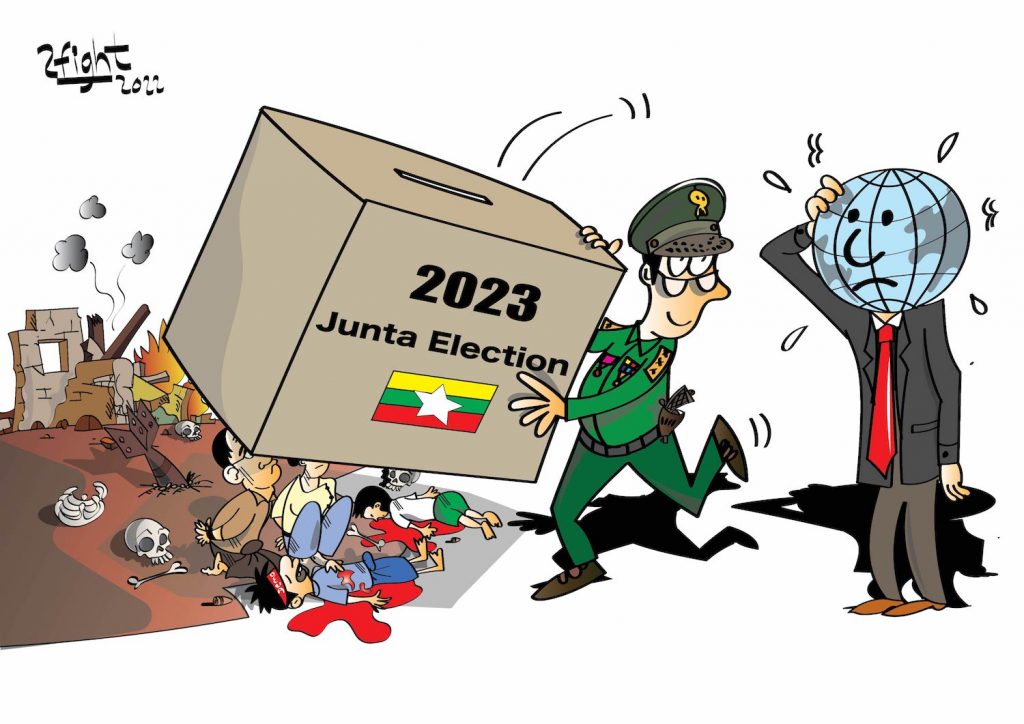The regime’s planned elections are designed to entrench military rule in Myanmar and offer no way out of the country’s crisis.
The election the military regime has scheduled for 2023 is integral to its quest for both domestic and international legitimacy. It’s safe to say how the people of Myanmar will respond to it: with total rejection. But should the coup council actually manage to hold the vote — far from certain given the widespread opposition to its rule across the country — it is absolutely imperative that the international community also recognise it for what it is: an attempt to entrench military rule in Myanmar for decades to come.
This is not an exit ramp; that would imply a change of course. The election was the plan all along. When Min Aung Hlaing stole power because he couldn’t accept that the National League for Democracy won a landslide in 2020, he announced immediately that fresh elections would be held, and shortly afterwards set a deadline of 2023. He then set out to rewrite the electoral rules to entrench military rule, by switching to proportional representation. With the Union Election Commission firmly under his control, he no doubt has more changes in mind, including to entice credible ethnic minority political parties into participating.
Had the people of Myanmar gone along quietly, Min Aung Hlaing would certainly have gotten away with it. Instead, his power grab sparked a mass uprising that has only grown in strength: tens of thousands of civil servants are on strike, vast swathes of the country do not have a single local administrator who answers to the junta, ceasefires with multiple ethnic armed organisations have collapsed and hundreds of local defence forces have taken up arms to fight against military rule. Over the past 18 months, resistance forces have slowly chipped away at the junta’s grasp on the country.
Despite this, Min Aung Hlaing has never really wavered from his plan to misuse an election to entrench his power. With an electoral victory all but assured, the only question – aside from whether the election can logistically be held at all – is whether the world will now let him get away with it. Will international actors ignore the will of the people, and recognise the winners of his sham election as the government of Myanmar?
Despite the clumsy, almost comical ways that the junta denies the atrocities its forces commit and the transparently false pretences under which it staged the coup, it would be a mistake to underestimate its savviness. Since seizing power, the regime consistently used narratives of electoral fraud, sovereignty and terrorism to push the legitimacy of its actions, because it understands the power of these words, and their ability to muddy the waters, undermine support for its opponents and obstruct international action.
These rhetorical tricks have been particularly effective with ASEAN, to whom most of the world has outsourced their response to the coup. In regional capitals, the junta is still seen as part of the solution to Myanmar’s crisis, despite being the source of the chaos and turmoil in Myanmar since the start of 2021. Given the divisions within the association over the Myanmar issue so far, it’s not difficult to imagine at least some of its members accepting the result of a junta-run election, no matter the circumstances under which it is held.
Even if the results are accepted by just a few countries, the consequences could be disastrous for the resistance movement. Some conflict monitoring groups have already fallen into the trap of seeing all non-state actors as terrorists. If the military, or military-aligned parties, are recognised as the government of Myanmar, it would only further strengthen the junta’s insistence that the many armed groups resisting military rule are terrorists. This has operational implications for these groups – everything from sharing information online to fundraising.
A new election also threatens to undermine the legitimacy of bodies like the National Unity Government, which is seen by many in the country as the real government of Myanmar. Although the NUG is not internationally recognised, it was appointed by the Committee Representing Pyidaungsu Hluttaw, which is made up of some lawmakers elected in the 2020 election (many elected lawmakers have been imprisoned). That gives it far more credibility to speak and act for the people of Myanmar than the regime, which seized power at the barrel of a gun. By creating a new pool of lawmakers, Min Aung Hlaing’s electoral charade would damage the legitimacy claims of both the CRPH and NUG.
For all its strangeness, the regime is sometimes an astute political institution that understands how to get what it wants on the international stage. It has sought strategic allies to ensure essentially no action will be taken against it at the UN Security Council and cosied up to its neighbours to ensure that almost nothing can happen at the regional level without its approval. No matter the outcome, the world must remember that the junta’s planned election is intended solely to entrench military rule and undermine the democratic opposition inside and outside the country. In doing so, it will only move the country further away from resolving the current crisis.







